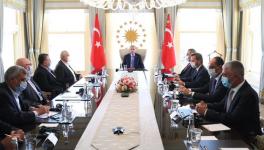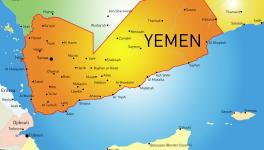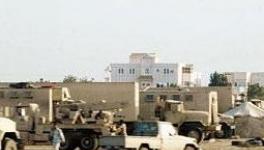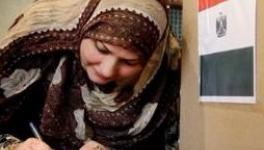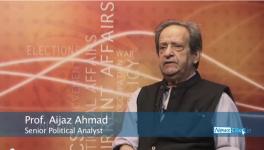El Sisi's Tainted Legitimacy
Elections have exposed the fragility of Sisi’s rule and sent up warning signs of the dangerous path that will be pursued. Votes are being counted, and declaring Sisi the winner is just a formality. However, a tainted legitimacy will haunt him.
In Dirin village near Mansoura, a man with a motorcycle campaigns for Sisi In Dirin village near Mansoura, a man with a motorcycle campaigns for Sisi. Demotix/Mahmoud Shahin. All rights reserved.Since the army ousted the elected President Mohamed Morsi in July 2013, a wave of nationalist fervour has prevailed. It was a part of a cleverly articulated media campaign to praise the army for its heroic role with a special focus on the then Defence Minister General Abdel Fattah El Sisi. Sisi was presented at every opportunity as a national hero who saved the country from the perils of a civil war. His intervention was portrayed as devoid of any ambition except, “preserving the life of Egyptians”.
This gratitude was soon turned into a mania and a kind of personality cult. His popularity had skyrocketed by 26 July 2013 when he asked for a popular mandate to confront the imminent violence and terrorism. The 'request' for this mandate was the peak on which the claims of national unity and consensus were then constructed. Following this moment, there was an evolving but intensive campaign stressing Egypt’s need for Sisi as president. Gradually, the image of the saviour was perfectly constructed. For some, Sisi's standing began to approach that of the prophets.
At this point, it became clear that talk had shifted from referring to the army as an arbitrator not as a ruler, to a new discourse of the need for a strong man who necessarily came from a military background in view of the dangers and conspiracies targeting Egypt. El Sisi was keen at the beginning to convey the message that he would not run for the presidency. He made it clear that he did not want history to say that the Egyptian army was making a move out of personal interests or ambition.
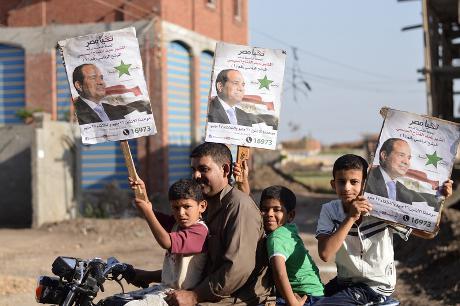
However, the idea of being a presidential candidate was steadily developed. IIn addition, it was presented in the framework of a popular commission (Taklif). Organised campaigns by the media and some public figures calling on Sisi to run for the presidency and portraying him as the saviour and the right man at the right time were in full flood. Against this background, the Supreme Council of the Armed Forces (SCAF) declared on 27 January 2014 its approval for Sisi to run for presidency. This declaration itself established a new pattern in the political role of the army.
Only within the above context, can we understand the nature of Sisi’s presidential campaign and the shock that accompanied the elections when they finally took place. Sisi’s campaign was devoid of any attempt to approach the people in the street. This was completely the opposite of what people experienced in the 2012 elections, where candidates were keen to communicate with the people and interacted with the streets. It would be correct to describe this as an elitist campaign that paid more attention to the artists, intellectuals, businessmen, sportsmen…etc. It clearly reflected a conviction that elites do not only count more but that they also endow a candidate with the consensual facade of enjoying the support of different spectrums of society. Sisi’s campaign tried to justify its remoteness from the street by letting it be known that its candidate was targeted and referring to the exceptional circumstances that the country was going through.
This was only a cover up of the fact that Sisi was already behaving not as a possible president-to-be, but as The President. There were many different clues to this attitude, the most important of which was the prerecorded interviews with the media. It was obviousto all that TV presenters were addressing him as The President not as a candidate. Sisi himself talked as if he was already in the presidential palace and firmly rejected or disrupted comments he did not like.
The second indicator was the lack of an electoral programme. Sisi denounced those who were calling for details of his programme on the basis that this would endanger national security. His discourse was full of slogans and emotional expressions but empty of any clear vision. It was obvious how he was harping on people’s longing for a strong leader. He, nevertheless, over stressed this call in a way that many thought revealed him as an autocrat-in-waiting.
More importantly, Sisi’s campaign was highly supported by Mubarak’s men and former members of the National Democratic Party. Mubarak himself announced, through a leaked phone call, his support for Sisi. Different state institutions showed their bias towards Sisi. In one newspaper, there was an item covering a meeting between Sisi and Ibrahim Mahlab – the current Prime Minister— in which they discussed the formation of his government. Ironically, Mahlab in the interview was openly talking about the neutrality of the government towards the two presidential candidates, while he was putting Sisi’s photo up on his desk.
In addition, in all his media interviews and meetings, Sisi repeatedly pointed to the fact that people had called on him and how he felt obliged to surrender to the people’s will. This is how the mandate moment defines the way he constructs his philosophy of governing: people ordered me to rule, they should not then ask about the details. This was also clear in his comment to those who asked about his programme. He simply said that they should have asked him this before he had left the army. The danger of this mental construction lies in the belief that people surrender their rights in return for stability and security - a Hobbesian way of thinking that raises deep concerns about the nature of his rule.
Sisi is also a keen proponent of the army's interest, categorically refusing any calls to bring its budget to public scrutiny. It was obvious in the talk how the army would remain a state unto itself, undertaking greater responsibility over the coming period.
Scandalous elections
The hallowed status surrounding Sisi is the main reason why the election turnout was more of a surprise to his opponents than his supporters. The scenes of empty polling stations have put a large question mark over the claimed overwhelming popularity of the Field Marshal.
Sisi and his entourage were hoping for another mandate by millions of Egyptians pouring into the polling stations. Sisi himself mentioned in one of his interviews the number of 40 million voters who would enable him to challenge the whole world. This focus on the voter turnout was aimed at dealing with the tainted legitimacy of his rule. On the one hand, Sisi seemed obsessed with the idea of getting more votes compared to those won by Mohammed Morsi. He wanted to prove that his move in July was not a coup but a real revolution. A high voter turnout would have allowed them to turn the page on the question of whether 3 July 2013 was a coup or a revolution.
On the other hand, large numbers of voters would have enhanced his legitimacy in the eyes of the world. Sisi’s legitimacy is still under fire from some parties like the African Union and is closely observed by western countries. Although the latter do not seem to oppose him as a ruler, they still have doubts regarding his ability to provide stability. When many voters cast their ballots, this must indicate confidence in the process and the regime. A high voter turnout would have enhanced Sisi's position as an indispensable stabiliser.
For these reasons, the low voter turnout reported by many independent and international media outlets – even the pro-Sisi media could not ignore the low number of voters — caused an immense panic to Sisi and his allies.
This became evident on all sides. First, there was the hysterical reaction on the part of pro-coup TV presenters who oscillated between enticing people to vote, frightening them by alerting them to the 500 pound fine stipulated by law, and finally by insulting them and accusing them of betrayal of their country. Then the dramatic late night decision by the government to make the second day of voting a public holiday, granting people free rides on the metro and buses in a desperate last attempt to encourage them to vote.
A third spectacle was the confused performance of the Supreme Committee for Elections which had to announce, without any ostensible reason, the extension of the chance to cast your vote for one extra day. Given the reported low voter turnout in the first two days, the Committee seems to have come under pressures to extend the vote to more Sisi voters. It became clear that Sisi was not competing with Hamdeen but with Mohamed Morsi, i.e. Sisi's determination to claim more votes than Morsi. This arbitrary decision of the committee questions the credibility of the whole process and casts doubts on its fairness. This is especially the case given the objection of Hamdeen Sabbahi’s campaign – and ironically Sisi’s campaign – to the extension, and subsequent withdrawal of all Sabbahi’s deputies from the polling stations.
The explanation for the low voter turnout varies. Some argue that Sisi’s popularity is mainly puff - a media phenomenon, and that his level of support has been widely exaggerated from the start. This opinion finds support in the recent results of Pew’s poll on Egyptian public opinion. According to the report, 54% has a positive view of Sisi, while 45% hold a negative view of him. Comparatively, 42% of Egyptians still have a positive view of the ousted President Mohamed Morsi. The report also revealed how 72% of Egyptians were not satisfied with the path their country was following. Whichever way you look at it, the results show that any claims of national consensus in suppoprt of Sisi was simply wrong: division is still dominant in Egypt.
The second explanation for Egyptians not showing up in large numbers at the polling stations looks to certain arms of the Egyptian deep state who may have felt threatened by Sisi’s claimed popularity. According to this logic, those state elements want Sisi to win but not to prevail. Sisi’s discourse may have frightened some of them off, given his over-confidence and self-centredness. The different branches of the deep state would prefer a president who is among equals so that he would pay close attention to their interests. A president with another overwhelming popular mandate may be a threat, as he may feel independent of their judgment. This may be a reason for the weak mobilisation of voters on the part of former cadres of the National Democratic Party who are experienced in elections and mobilising support.
In these ways, the elections in Egypt have exposed the fragility of Sisi’s rule and signalled warning signs on the dangerous path that will be pursued due to his policies. It clearly shows how his previous mandate has already expired. While the votes are currently being counted, declaring Sisi the winner is just a formality. However, his tainted legitimacy will haunt him.
Courtesy: opendemocracy.net
Disclaimer: The views expressed here are the author's personal views, and do not necessarily represent the views of Newsclick
Get the latest reports & analysis with people's perspective on Protests, movements & deep analytical videos, discussions of the current affairs in your Telegram app. Subscribe to NewsClick's Telegram channel & get Real-Time updates on stories, as they get published on our website.










